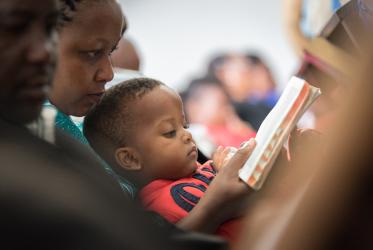Religious leaders must break their silence with regard to young people and sexual reproductive health, agreed young people and theologians gathered in Ivory Coast (Cote d’Ivoire) from 6-7 September.
Young people and women theologians from Ivory Coast and Togo met to discuss the theme “Sexuality and Contextual Study.” They spent two days sharing their views and experiences on raising awareness of youth vulnerability to the risk of early pregnancies and HIV infection. The training was organized by the World Council of Churches Ecumenical HIV and AIDS Initiatives and Advocacy (WCC-EHAIA).
Thirty-six theologians, adolescents and young people from the United Methodist Church of Cote d’Ivoire, Harrist Church, Christian and Missionary Alliance (CMA), Catholic Church, Association of Muslim Students, Association of Christian Students, and theological institutions met to reflect and find a common strategy to accompany young people, adolescents and parents.
From the statistics, fecundity in Cote d’Ivoire is 15% among young people and adolescents because of the lack of dialogue between youth and parents, lack of accompaniment, early sexual intercourse, psychological and physiological immaturity, risky behavior, wrong facts about sexuality, peer influence and insufficient information on sexual education. The training provided an intergenerational dialogue, a safe space for youth and adults to honestly share, and enable young people to identify much-needed role models.
Sharing a testimony, Pastor Yao Aimée from CMA said: ”I was told by my tutor to find someone who can provide me the service of sexual intercourse, and I followed his advice, not knowing that this was wrong and this has led to various challenges in my life.” This testimony encouraged young people to seek the right information, know their body and resist peer influence.
Young people lack role models in responding to the stakes posed by early sexual relations. The interreligious space provided has enabled participants to highlight challenges related to sex and sexuality for youth.
Key actions identified to break the silence and appropriately accompany the children are to continuously teach Christian and Muslim values to children and enable parents to be trained on issues of sexual reproductive health and sexuality for the sake of the children. A “Whatsapp group” — an online group chat feature — was created to continue sharing the vision developed by young people: “an Ivorian youth, affected and/or infected, responsible and blossomed for a new generation without AIDS.”
Trainers and participants acknowledged the importance of listening in the education of children.
“Showing the example by attitude has more meaning for the youth than the declarations,” concluded Ayoko Bahun-Wilson, West Africa regional coordinator for the WCC-EHAIA. “Religious leaders need to be more present in action rather than in speeches ,” she said.
She also encouraged young people, their families and religious leaders to participate in “All In,” a platform offered by UNAIDS, UNICEF and their partners for action to drive better results for adolescents by encouraging strategic changes in policy and engaging more young people in the effort.










